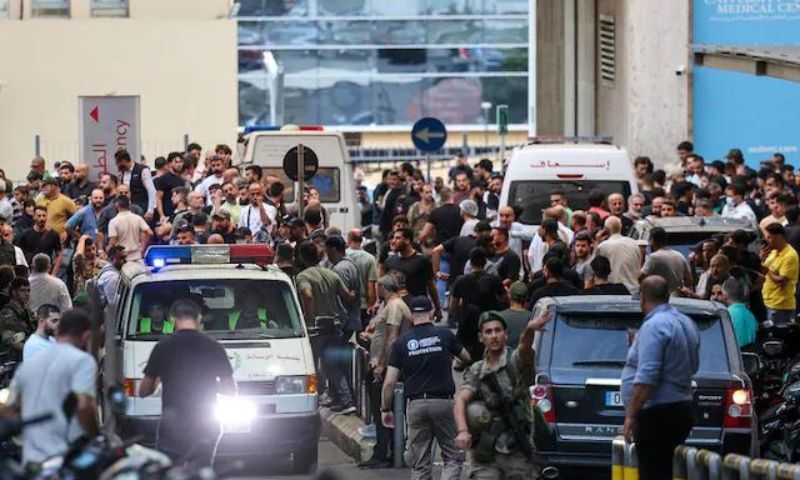BEIRUT: Lebanon’s Health Minister Firass Abiad said nine people were killed and more than 2,800 injured in pager explosions across the country Tuesday afternoon, with Hezbollah earlier saying the pager devices were used by its members.
The blasts “killed eight people, including a girl”, he said during a televised press conference. “About 2,800 people were wounded… over 200 of them critically” with injuries mostly reported to the face, hands and stomach, he added.
A source close to Hezbollah said the explosions were the result of an “Israeli breach” of its communications.
A Hezbollah official said the detonation of the pagers was the “biggest security breach” the Lebanese group had been subjected to in nearly a year of war with Israel.
The blasts, which struck locations in Beirut’s southern suburbs, south Lebanon, and the eastern Bekaa Valley, are the first of their kind since Hezbollah engaged its near-daily exchanges of fire with Israeli forces in support of Palestinians in Gaza.
Lebanon’s Health Minister Firass Abiad confirmed that the explosions injured hundreds across the country. Reports indicated that Hezbollah members were among the most affected, with ambulances rushing to hospitals in Beirut, Tyre, Sidon, and the Bekaa Valley. The Lebanese Red Cross was placed on high alert to manage the influx of casualties.
Hezbollah had previously advised its members to avoid using mobile phones and rely on their own telecommunications systems to prevent such breaches. The explosions were seen as a significant setback for the Lebanese group’s communication strategies.
There was no immediate comment from the Israeli military, but an unnamed source close to Hezbollah attributed the incident to an Israeli breach. The explosions come amid escalating violence between Israel and Hezbollah, following a broader Israeli bombardment campaign in Gaza that has expanded to include Hezbollah’s activities along the northern border with Lebanon.
Israeli Defense Minister Yoav Gallant stated that military action was necessary to ensure the security of Israel’s northern communities. On Monday, Israeli strikes killed three people in Lebanon, who were reported to be Hezbollah members.
The ongoing conflict has led to significant displacement, with tens of thousands of people fleeing their homes on both sides of the border. The exchanges have resulted in hundreds of deaths, mostly fighters, with civilians also caught in the crossfire.
Hezbollah’s deputy chief, Naim Qassem, said that while the group had no intention of escalating to full-scale war, significant losses were expected if the conflict continued. Meanwhile, Hamas, which is allied with Hezbollah, has prepared for a prolonged resistance war with Israel in Gaza, according to its leader Yahya Sinwar.
Since October 7, Israel has launched a relentless bombardment campaign in Gaza killing at least 41,252 Palestinians, mostly women and children, the territory’s health ministry reported on Tuesday.
Meanwhile, US Secretary of State Antony Blinken is expected to visit Egypt this week to revive ceasefire talks for the Gaza conflict. Despite ongoing negotiations, a resolution has remained elusive.
While months of mediated negotiations have failed to pin down a ceasefire, the United States said it was still pushing all sides to finalise an agreement.
To bridge the remaining gaps, Washington was working “expeditiously” on a new proposal, said State Department spokesman Matthew Miller.
Miller said Blinken would discuss during a visit to Egypt this week “ongoing efforts to reach a ceasefire in Gaza that secures the release of all hostages, alleviates the suffering of the Palestinian people, and helps establish broader regional security”.
US officials have expressed increasing frustration with Israel as Netanyahu has publicly rejected US assessments that the deal is nearly complete and has insisted on an Israeli military presence on the Egypt-Gaza border.
Mounting pressure has failed to sway him to agree to a hostage release deal that has wide support from the Israeli public.
The UN General Assembly will debate a draft resolution demanding an end to the Israeli occupation of Palestinian territories, which Israel has condemned as “disgraceful.”
General Assembly resolutions are not binding, but Israel has already denounced the new text as “disgraceful”.























